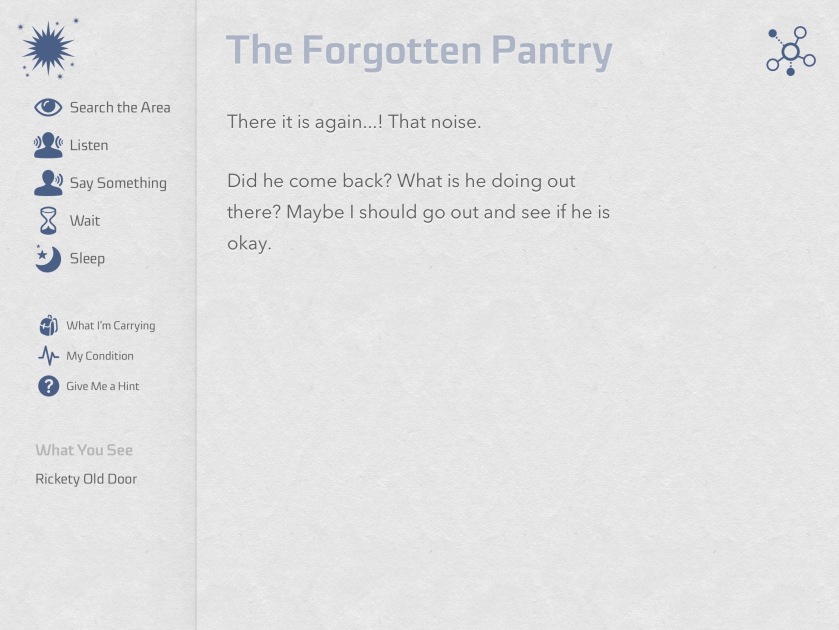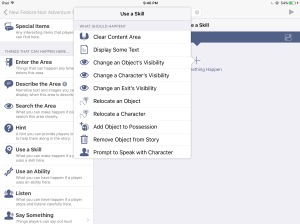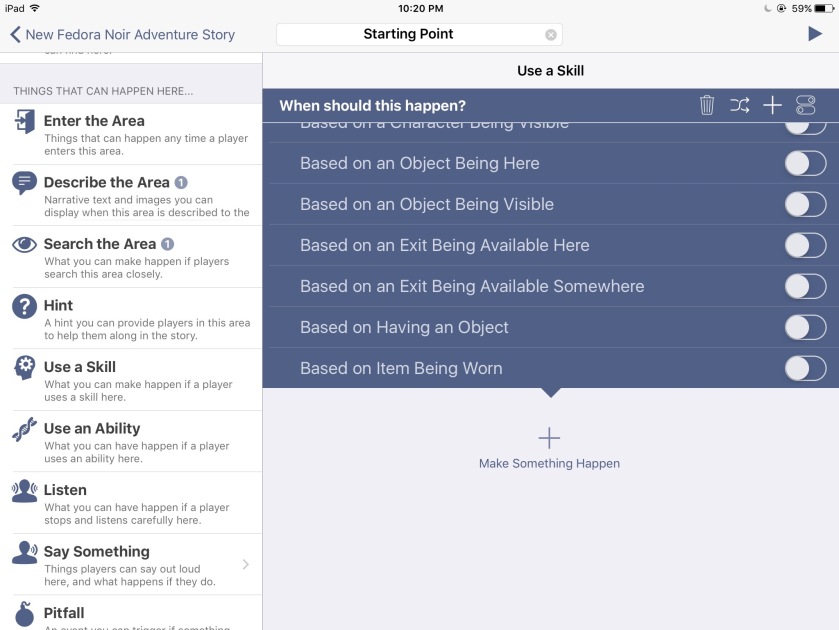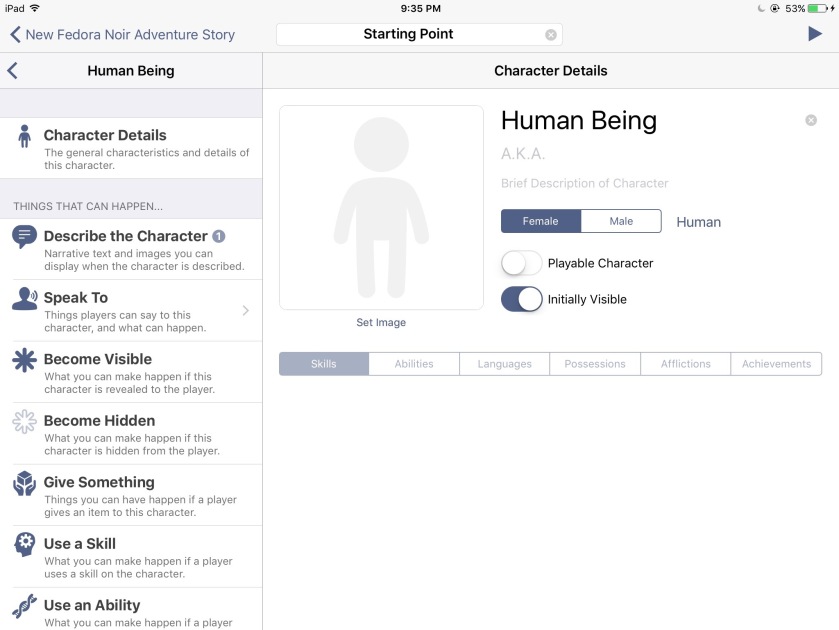
Wunderverse is not a game but an iPad adventure editor that lets you build your own stories. It comes with a few starter adventure chapters already written, though as far as I saw it didn’t look like any of them were finished stories. Of these, I completed the sample set in the paranormal world: a vaguely Sixth-Sense-y story that could have been more strongly written and that still had a couple of typos. But I have the feeling that the actual content is not what the app’s creators most care about; they’re looking at this primarily as a tool.
 The good: the app looks pretty slick, and it features the ability to theme your stories and include sound effects and other elements.
The good: the app looks pretty slick, and it features the ability to theme your stories and include sound effects and other elements.
Though it has a tap-only interface, the underlying world model feels more like parser IF than the models in most competing systems. You can create nodes and objects, and certain verbs remain available to the player at all times. The system also provides for player character stats and abilities, and for conversation. Nodes function sort of like rooms and sort of like narrative nodes, so you could take this either in a very map-based direction or in the direction of a more CYOA-style narrative. (Personally I feel a little bit itchy about conflating space and narrative state into the same thing, but I accept that it’s sometimes useful to do so.)
The bad (at least for me): this thing really assumes that you’re going to type all your story content on your iPad. I guess I could try to hook up an external keyboard, but for me that feels like a punitive way to design. Also, the creator involves a lot of nested menus and whatnot. In my experience, this can be a good way to learn but creates a lot of friction if you’re trying to build substantial amounts of content.
It also offers long dropdown lists of conditions you might want to check when deciding whether an event should fire. It’s long enough that you can’t see all the conditions at once.

When I look at this, I don’t know what it means to attach multiple conditions to an event. For that matter, I’m not even sure how to tell the system which skill is hypothetically supposed to be producing this effect.
And it’s not easy to find out the answers to these questions because the try-then-test cycle is a bit slow: you have to try something in the editor, then back out a bunch of steps and click through starting your story, then play through to whatever point you were at when the affected behavior occurs.
To change it a second time, you then have to click back in (select your story, select to edit it, select the node you want to edit, select the item within the node that you want to change, select the submenu…). Lots of friction here.
Contrast Twine’s ability to start at a selected node while keeping the editing window live in the background; or Inform’s recompile-and-replay feature; or StoryNexus’ ability to play a single storylet on command to test it.
The undecided: the stories I tried so far were just introductory chapters, which means that I don’t know how this would feel to play out with a longer piece.
There’s a fair amount of prefab world-model concept as well, as you can see from the interface. In general, sometimes a developed world model is good; sometimes it means that the system will only ever do exactly what the designers had in mind and it’s wretchedly difficult to work outside the box.

In this particular case, I’d probably have to invest more hours investigating, but what I saw so far suggests a system that could still use some streamlining and generalization. For instance:
- The protagonist has both “skills” and “abilities”. It’s unclear what the difference is.
- The protagonist also automatically has a list of languages. This does not seem to have anything to do with language of display; it seems to tie (again) to speaking ability, but it’s less obvious why we’d be checking this and not want to model it in terms of skills/abilities.
- There are some provided item classes: Food, Drink, Gold, Small Bag of Gold, and Gold Chest. This rather suggests a system designed for a particular type of D&D-style fantasy quest. The creator doesn’t seem to have different item classes tied to the genre of story you’re creating: these options appeared for me even though I was trying to create a Fedora Noir Adventure Story.
Finally, distribution: the app allows you to share stories with your friends. This is cute, but writing an adventure is a lot of work. The handful of my friends who might have an iPad and further might be persuaded to buy Wunderverse? Probably not a big enough audience for me (at least) to want to invest the time building something out.
And, of course, there are always the usual questions about the longevity of a proprietary, one-platform project. (Yes, I am conscious of the ironies here, thank you.)
I didn’t invest enough time in Wunderverse to sincerely try to write a complete piece of IF, so it’s entirely possible that I would have run up against issues beyond what I just described. That said, despite the criticisms I just outlined, I am intrigued by the fact that it’s exploring another, different space in the choice-v-parser interface arena. There’s obviously quite a bit of work already in this app; I’d just ideally like to see something that offered a desktop composition app, wider distribution possibilities, and way, way less friction in the composer.
(Disclosure: I tried a copy of Wunderverse that I bought with my own money.)
Hi Emily,
My name is Shawn, one of the creators of Wunderverse. I learned of your post this morning from some of your readers! We really appreciate your thoughtful analysis and insights. It’s exactly the kind of feedback we’re looking for to help us make Wunderverse something IF authors will enjoy.
We have big plans for Wunderverse, including many of the ideas you touched on here. We need this kind of feedback from actual writers like you to help us implement them well. We’re also looking to partner with IF authors to help us create original content.
If you or your readers know of anyone who might be interested in either, we would love to talk.
Why not an iphone versión? I’d love to write stories on the go!
Thank you very much for your review of Wunderverse, Emily. :)
I purchased it as well a few hours ago, wanting a text adventure generator on my I-Pad as well as my PC and Mac.
I am still very new to programming such, with only a couple of months long attempt from 2009-2010 in Quest, Adrift, Inform7 and TADS3 all failing, as well as an even briefer attempt in later 1982, in a raw form within the Basic programming language, failing of course, being a very noobie computer owner.
After 2 weeks back into trying again, I so far have my first tiny game completed using Inform7. (With great thanks out to Jim Aikin for his wonderfully written handbook.) I gave up again on TADS3 due to having a difficult time comprehending Eric Eve’s instructional writings. I wrote off Quest and Adrift as well due to bugs and / or inconsistencies in each.
So whilst I continue to teach myself Inform7 with assistance from Jim’s wonderful writing, I’m having hopes for Wunderverse partially, as a rough idea game generator at least, from which I may take my story ideas to fuller rebuilds within Inform7. Am enjoying it overall so far, with very minor nitpicks in my self-learning.